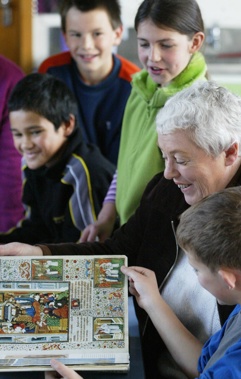
Rotorua’s gifted kids will be able to participate in a new One Day School programme from April.
The fully-funded One Day School programme will be based in the building on the corner of Hinemaru and Hinemoa streets.
“It offers adventures in learning which allow for more questioning and exploration and hands-on discovery for more extended periods of time,” founder Dr Rosemary Cathcart said.
“For four days a week, they will be at their usual school but on the fifth day they’ll be involved in a high-interest programme especially designed for children’s needs [that] can be difficult for the teacher to meet in today’s busy classrooms.”
Set up by Cathcart with the help of a local charitable trust, the One Day School is scheduled to open in Term Two.
Cathcart, who was made an Officer of the New Zealand Order of Merit on January 1 in recognition of her 40 years of service to gifted children, designed the programme to meet the needs of advanced learners.
Classes will have a maximum of 15 students, each nominated by their schools or their parents “in liaison” with the school.
“Nominated children will take part in an assessment activity to make sure that the programme will be a good fit for them and will match their needs,” Cathcart said.
“Children accepted after assessment will normally enrol for the full year. Many will continue on into the following year.”
Cathcart said participation in the One Day School Programme would cost families $50 per term with the fees going towards learning resources.
Cathcart said it could be easy to forget that for children the “one size fits all” approach did not work.
“Being different, especially learning more quickly than your classmates, doesn’t make you popular,” Cathcart said.
“School can be very lonely for a child like this and also very frustrating. It’s not really surprising to learn that, contrary to many people’s conceptions, such children are highly likely to underachieve at school, sometimes even fail.”
Cathcart first put the One Day School into practice in 1996 through the then-George Parkyn National Centre for Gifted Education.
“This proved to be a very successful innovation, growing to have some 600 children enrolled with it.”
Cathcart, who now lives in Rotorua, has accepted an invitation to set the programme up here. She will be joined by teachers experienced in the field.
Cathcart said some information had already been sent to schools about the programme and a parent meeting would be advertised soon.
A trustee of the local charitable trust funding the One Day School said its decision to resource the project was based on “the opportunity to provide a fabulous New Zealand-based education programme in Rotorua”.
“The trust stands to provide a helping hand to those that are prepared to also work towards their own goals and improvement,” the spokesperson said.
“It is positive for the age group this is focused on, great for our parents to know there is extra support for their children and will strengthen our community. It is professional, robust, and led by such a passionate director.”
/cloudfront-ap-southeast-2.images.arcpublishing.com/nzme/DPZNK3GEJFF65JWIDAD4NVY4TE.jpg) A One Day School programme for gifted children is coming to Rotorua and will be based at this building on the corner of Hinemaru St and Hinemoa St. Photo / Andrew Warner
A One Day School programme for gifted children is coming to Rotorua and will be based at this building on the corner of Hinemaru St and Hinemoa St. Photo / Andrew Warner
How can giftedness affect children?
According to the New Zealand Centre for Gifted Education’s website, a gifted child’s brain is wired to learn and process faster. Researchers estimate that between 5 to 10 per cent of the population are gifted. In New Zealand, giftedness affects about one in 20 children or about 47,000 primary school-aged students.
About 30 per cent of these children have an additional neurodiversity like ADHD, ASD and dyslexia.
Indigo Assessment, Coaching and Counselling registered educational psychologist Angela Neville said when a gifted child’s needs were not met they could often become disengaged.
“This may present as children acting out, becoming disruptive or other behavioural challenges and can also sometimes lead to anxiety, stress, or depression.”
Neville said another difficulty was that gifted students could be affected by “asynchronous development”, where their intellectual abilities may be more advanced, or out of sync with their age-appropriate skills in other areas, such as emotional or social skills.
“Gifted children can [also] often be hindered by ‘perfectionism’, where they may take a lot more time and effort to do things exactly ‘right’ or may give up if they feel they are out of their depth.”
To thrive, Neville said it was “helpful” if gifted children could be immersed with groups of like-minded individuals where they could follow their interests and passions and be stimulated and challenged.
What are some signs of giftedness?
- An early interest in surroundings
- Super-sensitivity to surroundings
- Strong curiosity and powers of observation
- An extensive vocabulary
- An exceptional memory
- May talk early and fluently
- The ability to read early – often self-taught
- Can choose to concentrate for long periods
- The propensity to ask shrewd/unusual questions
- The ability to grasp ideas quickly
- A quirky sense of humour
Source: New Zealand Association for Gifted Children
- NZ Herald
Take your Radio, Podcasts and Music with you









